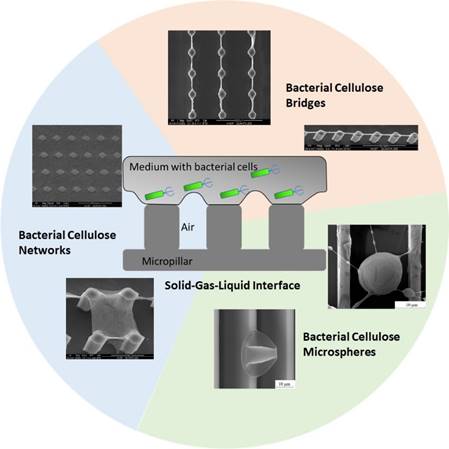Synthesis of bacterial cellulose based on solid-gas-liquid interface
Bacterial Cellulose (Bacterial Cellulose, BC) is a kind of consists of gluconic acid bacilli in the process of growth of synthetic Cellulose with nanoscale. BC due to its good biocompatibility and mechanical properties make it widely in biomedical research and application. For more sensitive glucose wood vinegar coli oxygen demand characteristics, manufacturing micro column lithography wafer surface with different structure, and further in the silicon wafer surface evaporation a layer of 17 fluorine silane decyl three oxygen radicals, make the silicon wafer with super hydrophobic properties, on a watering can be different droplet size of bacteria liquid spraying on the silicon wafer,
A "solid-gas-liquid" three-phase interface was formed to solve the problem of oxygen demand between the ordered microtemplate and the bacterial culture medium, and many fine micro-size fiber structures were obtained according to the different droplet sizes. Further, the cell culture on the fiber net was explored for its application in cell capture.
The results were recently published in Chinese academic journal, Chinese Journal of Polymer Science and SCI, "Synthesis of Bacterial Cellulose based on Solid-gas-liquid interface" (DOI: 10.11777/ J.issn1000-3304.2020.20110).
This research is the result of Yang Guang's team, with doctoral student Zheng Ruizhu as the first author and Huazhong University of Science and Technology as the first unit.
The research was supported by the key special project of the national key research and development program "intergovernmental cooperation in science and technology innovation/Hong Kong, Macao and Taiwan science and technology innovation cooperation" (project no. 2018YFE0123700) and the national natural science foundation of China (fund no. 51973076,21774039).
